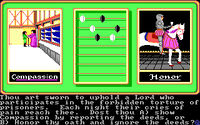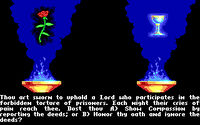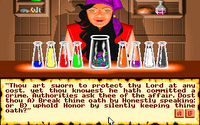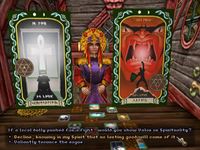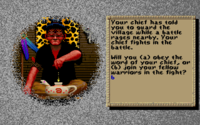Character creation
The character creation is a key portion in most of the games.
Early Ultima games used a simple, point-allocation system, wherein the player raised or lowered statistics as desired. This was the standard for Ultima I, Ultima II, and Ultima III.
The classic character creation sequence, where the Gypsy gives the player a quiz of the Eight Virtues to determine starting profession is featured in later Ultimas. It originally appeared in Ultima IV, where she used tarot cards and an abacus with white and black stones to indicate which Virtues were favored and disfavored respectively.
In Ultima V, the Avatar claimed to remember this, but this time the symbols of Virtue were shown in strange mist rising from bowls (although the questions are still the same). This changed further in Ultima VI, where the gypsy mixed a potion with 8 smaller potions colored after the Virtues. These ritualistic variations aside, the creation process is functionally the same.
Creation Process[edit]
The creation of the character happens in an elimination-system for the Eight Virtues that goes as follows: the gypsy asks seven questions in total. The first four have all eight of the Virtues in them, pitting them against each other in pairs. Thus four of these Virtues will be eliminated, and the remaining Virtues again compete against each other in subsequent rounds. Once seven Virtues have been eliminated, the remaining Virtue will be the one with which the Stranger is most closely associated.
Each of the other seven Virtues contributes to the Stranger’s stats, in proportion to the how much the hero favored them. In the picture example, Honor is chosen as primary Virtue. However, not only the three choices of Honor contribute to the stats, but also the choices of Honesty, Justice and Spirituality.
Here how each Virtue contributes to the stats each time it is chosen:
- Honesty: +3 INT.
- Compassion: +3 DEX.
- Valor: +3 STR.
- Justice: +1 DEX and +1 INT.
- Sacrifice: +1 STR and +1 DEX.
- Honor: +1 STR and +1 INT.
- Spirituality: +1 STR, +1 DEX and +1 INT.
- Humility: Contributes no stats at all.
This reveals several things. Those aiming to maximize their beginning stats will want to avoid choosing Humility, as it gives no bonuses at all. The sum of stat bonuses for each of Justice, Sacrifice and Honor are smaller than those of Honesty, Compassion, Valor and Spirituality. However, those simply answering the questions as intended – to create a character with Virtues as close to the player's own moral leanings as possible – should not worry too much about these choices.
Deviations[edit]
In two of the main Ultima games, there exist deviations, where something extra is also determined with the final Virtue chosen.
Ultima IV[edit]
In Ultima IV, the final Virtue chosen determines the player's character class, while from Ultima V onwards, the player is the Avatar. This has an impact on the game, since numerous things are determined together with the final choice:
- Starting location
- Starting equipment
- Which of the Companions cannot join
- Magical ability
- Allowable weapons and armour
Ultima IX[edit]
The character creation of Ultima IX: Ascension is very different from other installments in the series. While the question system and even the questions themselves are the same, only the final choice of Virtue determines the stats of the Avatar. Also, the system has totally changed and stats are divided in 4 levels (1–4), starting with each stat at 1. Also, karma – which is analogous to mana in Ascension – is given in the process and the extra items in the starting equipment are determined.
As a rule of thumb, each class gets two stat-level raises (of the same or of different stats) and one karma raise of five points. The exceptions are the ranger, who gets one level for each stat but no karma, and the shepherd, who gets no stat-levels but a hefty +15 karma bonus. Note that this means that a shepherd can never maximize his stats, since stats are only raised 8 times, and there are 9 possible levels.
The stats are given in levels 1–4, and the karma bonus is shown as well. Each level in STR translates to 30 HP, and each level in INT in 10 mana.
| Class | STR | DEX | INT | Karma | Extra Equipment |
|---|---|---|---|---|---|
| Mage | 1 | 1 | 3 | +5 | Arms of the magi, map of Moonglow |
| Bard | 1 | 3 | 1 | +5 | Target bow, 42 arrows, map of Paws |
| Fighter | 3 | 1 | 1 | +5 | Scimitar, map of Valoria |
| Druid | 1 | 2 | 2 | +5 | Staff, map of Yew |
| Tinker | 2 | 2 | 1 | +5 | Buckler, map of Minoc |
| Paladin | 2 | 1 | 2 | +5 | Chain coif, map of Trinsic |
| Ranger | 2 | 2 | 2 | +0 | Sextant, Skara Brae key (chest at shore with blackrock helmet) |
| Shepherd | 1 | 1 | 1 | +15 | Crook of Charming |
All characters get a Light scroll, a Fireball scroll, a bag and four potions (white, orange and two yellow ones).
Worlds of Ultima Games[edit]
As these two installments do not take place in the standard Ultima universe, they do not concern themselves with the main character's standing in the eight Virtues. Instead, each game presents its own unique method of determining the player's statistics:
Savage Empire[edit]
At the beginning of Savage Empire, Intanya asks the Avatar a series of questions (beginning with the hero's chosen name), which closely resemble those given by the Gypsy in the character creation sequence of the mainline Ultima installments. These questions determine the player's starting attributes in a similar manner. However, he will only ask three questions out of a pool of six possible ones, each time pitting two stats against each other. With a little deduction it can be easily determined which choice represents which stat, still, all questions and the result of the answers are presented in the following table.
| Question | Answer A | Answer B |
|---|---|---|
| The warrior's borrowed spear | DEX | INT |
| Entrusted with a pouch of gems | INT | DEX |
| The chief forbids you to enter a battle | INT | STR |
| The chief murdered someone | STR | INT |
| A warrior demands your food | STR | DEX |
| Your enemy is at your mercy | DEX | STR |
The first question is chosen randomly. The second question then sets the discarded stat against the one remaining stat. The third question then offers a choice between the two winners. That always means one stat gets no boost (16–18), one gets a weak boost (19–23), and one gets a strong boost (22–26). There still is an element of chance with the exact numbers which cannot be influenced.
Martian Dreams[edit]
In Martian Dreams, the questions of Sigmund Freud determine the player's name, gender and starting attributes in a similar manner to Savage Empire’s questioning sequence. The first question after which parent the Avatar takes after actually determines the Avatar's sex. The following four questions are always the same and work in concert together with a random numbers generator to determine the stats of the Avatar. Since it is impossible to find an exact formula, some experimentation is needed.
The following table shows all possible combinations of answers and roughly what kind of stats can be expected. Remember, that only goes for questions after the gender decision.
| STR | DEX | INT | ||||
|---|---|---|---|---|---|---|
| A | A | A | A | 25 | 18 | 22 |
| A | A | A | B | 24 | 19 | 25 |
| A | A | B | A | 20 | 24 | 26 |
| A | A | B | B | 18 | 26 | 22 |
| A | B | A | A | 26 | 24 | 20 |
| A | B | A | B | 24 | 26 | 19 |
| A | B | B | A | 22 | 24 | 24 |
| A | B | B | B | 21 | 26 | 23 |
| B | A | A | A | 25 | 20 | 24 |
| B | A | A | B | 24 | 20 | 26 |
| B | A | B | A | 20 | 23 | 26 |
| B | A | B | B | 21 | 26 | 22 |
| B | B | A | A | 22 | 21 | 24 |
| B | B | A | B | 24 | 20 | 22 |
| B | B | B | A | 24 | 23 | 21 |
| B | B | B | B | 23 | 26 | 21 |
| C | A | A | A | 24 | 23 | 21 |
| C | A | A | B | 24 | 25 | 22 |
| C | A | B | A | 21 | 24 | 24 |
| C | A | B | B | 22 | 25 | 22 |
| C | B | A | A | 24 | 19 | 23 |
| C | B | A | B | 22 | 18 | 24 |
| C | B | B | A | 24 | 24 | 20 |
| C | B | B | B | 24 | 24 | 21 |
Ultima Underworld and Ultima Underworld II[edit]
The character creation of Ultima Underworld and Ultima Underworld II, instead of the stylized in-game theatrics of previous games, has the player to select concrete numbers for the various stats. See Character creation in the Underworld games.
